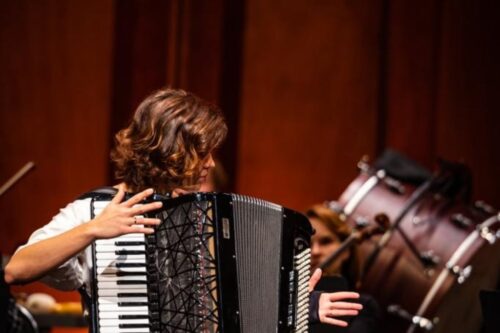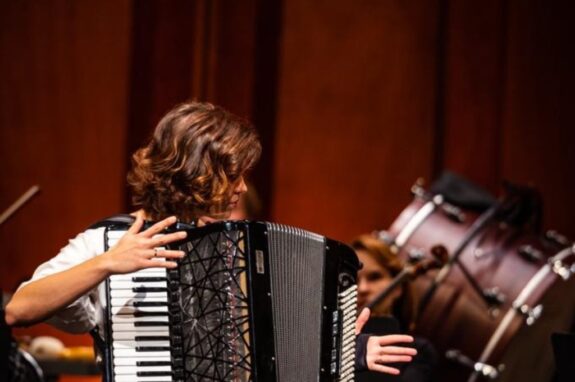 Switzerland Sibelius, Tüür, Beethoven: Ksenija Sidorova (accordion), Tonhalle Orchestra Zurich / Paavo Järvi (conductor). Tonhalle, Zurich, 19.11.2021. (JR)
Switzerland Sibelius, Tüür, Beethoven: Ksenija Sidorova (accordion), Tonhalle Orchestra Zurich / Paavo Järvi (conductor). Tonhalle, Zurich, 19.11.2021. (JR)

Sibelius – Symphony No.7, Op.105
Erkki-Sven Tüür – Prophecy for accordion and orchestra
Beethoven – Symphony No.8, Op.93
This concert was to have been performed just as the COVID-19 pandemic started and was the first to be cancelled. Thankfully, the orchestra’s management were able to re-schedule it.
Sibelius first entitled his last symphony, his Seventh, as ‘Fantasia sinfonica’; it was one of his final works, composed in 1924 when Sibelius was nearly 60. (He lived to the ripe old age of 92, composing nothing of note in his long retirement years).
His short Seventh was first structured as three movements, but Sibelius later merged them into one movement with three distinct parts. It was wonderful to hear Sibelius in Zurich again, a composer virtually ignored by the two previous Chief Conductors, David Zinman and Lionel Bringuier. Järvi has a natural affinity with Sibelius – Helsinki being only a short ferry ride from Estonia’s capital, Tallinn. The orchestra’s string section blossomed, but the undoubted star of the show was David Bruchez-Lalli, Principal Trombone.
The accordion is a hard instrument. Difficult to play, heavy to lift, and – from what I overheard after the concert – not everyone’s cup of tea. Its high-pitched sound does not blend easily with that of a symphony orchestra. Ksenija Sidorova from Latvia wins over the audience with her undeniable technique and stage presence. Erkki-Sven Tüür is an old school friend of Paavo Järvi’s and he was in the audience. Tüür’s compositional style is a mixture of avant garde techniques, rhythms of rock and pop, with some Estonian folk tunes thrown in for good measure. Tüür composed his piece for accordion and orchestra, entitled Prophecy, in 2007; like the Sibelius, it too is in several movements but merged into one. It moves seamlessly from one section to the next. It was all a bit of a mishmash, but ever easy on the ear. The central section was a dirge, the piece salvaged by a finale full of panache and raw energy. Percussion of all types coloured the orchestration: Klaus Schwärzler and Andreas Berger did the honours on glockenspiel, vibraphone, woodblock and tambourine.
An encore brought us straight into the Parisian bistro: a charming, melancholic rendition of a piece entitled ‘Revelation’ by Russian composer Sergey Voitenko.
Beethoven’s Eighth Symphony is numerically sandwiched between two mighty symphonies and suffers somewhat as the poor cousin. At its premiere it was coolly received. It is full of wit and playful levity. There is no traditional ultra-slow movement: after an uplifting opening movement, we are instead treated to an amusing Allegretto scherzando and a charming minuet. Without a score, Järvi clearly knew every nuance of the piece. In the second movement, I particularly noticed Järvi’s highlighting of a pizzicato figure in the second violins. Järvi’s only nod to historical accuracy was the use of period timpani. He took the last movement fast, and we wandered off into the chilly night air with a warm glow.
John Rhodes
